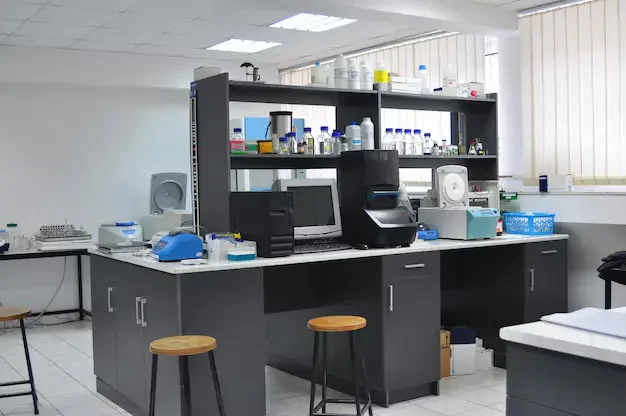When it comes to creating an efficient and durable laboratory workspace, choosing the right material for your lab benchtops is a critical decision. Lab environments are demanding, and the material you select must endure heavy use, resist damage, and meet your specific requirements. In this guide, we’ll break down the essential factors to consider, highlight the top lab benchtop materials, and help you determine the best choice for your needs.
Key Factors to Consider When Choosing Lab Benchtop Materials
Durability and Longevity in Lab Work Environments
Imagine investing in a benchtop that looks great at first but begins to warp or crack after just a few months of use. That’s a nightmare no lab wants. Durability is crucial, as lab benchtops endure everything from heavy equipment to repetitive tasks. Opt for materials like epoxy resin or stainless steel that are built to last, saving you the headache—and budget—of frequent replacements.
Resistance to Chemicals, Heat, and Scratches
Your lab might handle harsh chemicals, high temperatures, or abrasive tools daily. A chemical spill on a laminate benchtop can lead to stains and damage, while heat from equipment could deform less robust surfaces. Materials like epoxy resin and phenolic resin excel here, offering chemical-resistant and heat-tolerant surfaces that can handle tough lab conditions without flinching.
Ease of Maintenance and Cleaning
Labs require rigorous hygiene standards, and your benchtops need to be easy to clean and maintain. Stainless steel, for instance, is a dream for cleaning enthusiasts—just a quick wipe, and it’s spotless. On the other hand, porous materials can trap residues, making thorough cleaning a challenge. Choosing a low-maintenance material ensures your workspace stays safe and efficient.
Top Materials for Laboratory Benchtops
Epoxy Resin: A Versatile and Reliable Option
Epoxy resin is the MVP of lab benchtop materials. Its unmatched chemical resistance and ability to withstand high temperatures make it a go-to choice for chemistry and biology labs. Plus, it’s water-resistant, so no worries about accidental spills wreaking havoc. While it’s a bit pricier, its longevity justifies the investment.
Stainless Steel: Hygienic and Robust
If labs had a “clean freak,” stainless steel would win the title. Its non-porous surface repels bacteria and makes cleaning a breeze. Ideal for medical and food science labs, it’s also corrosion-resistant. The only downside? It might show scratches over time, but let’s call that “character,” shall we?
Phenolic Resin: Lightweight Yet Durable
Phenolic resin offers a balance between performance and weight. It’s resistant to chemicals, moderate heat, and impact, making it suitable for labs with medium-duty needs. Its sleek appearance is an added bonus for labs that want both functionality and a modern look.
Laminate Benchtops: Cost-Effective but Limited
For labs on a budget, laminate benchtops might seem appealing. They’re affordable and available in various designs. However, they lack the chemical and heat resistance of other materials, making them better suited for light-duty tasks. Think of them as the entry-level option for scientific worktops.
Comparing Lab Benchtop Materials for Different Applications
Materials for Chemistry Labs
Chemistry labs require benchtops that can laugh in the face of harsh chemicals and high temperatures. Epoxy resin stands out here for its durability and resilience.
Materials for Biology and Medical Labs
In biology and medical settings, cleanliness is king. Stainless steel and phenolic resin offer the hygienic, easy-to-clean surfaces needed for sterile environments.
Materials for Industrial Testing Labs
Industrial labs need heavy-duty benchtops that can handle physical impact and large equipment. Phenolic resin and stainless steel are often ideal for these demanding spaces.
How to Choose the Best Material for Your Laboratory Needs
Evaluating Your Lab’s Specific Requirements
Does your lab deal with corrosive chemicals or heavy machinery? Identifying your specific needs ensures you choose a material that can handle your daily challenges.
Balancing Budget and Performance
While premium materials like epoxy resin may cost more upfront, they offer long-term savings due to their durability. Think of it as an investment in fewer headaches down the road.
Long-Term Value and Sustainability
Sustainability is increasingly important. Materials like phenolic resin, which can be produced using environmentally friendly methods, offer a greener option without compromising performance.
Why Investing in Quality Lab Benchtops Matters
Ensuring Safety and Efficiency
Poor-quality benchtops can lead to accidents or inefficiencies. A durable, well-suited benchtop not only protects your team but also supports productivity.
Enhancing Laboratory Productivity and Results
The right benchtop material can streamline workflows, minimize maintenance, and create an optimized environment for innovation.
Get Expert Advice on Choosing the Best Lab Benchtop Material
Ready to elevate your lab with the perfect benchtop? Our experts can guide you through the options and find the ideal solution for your unique needs. Contact us today for a free consultation and quote!
FAQs
1. How do I know if my lab benchtop needs to be replaced?
If your current benchtop has visible damage like cracks, stains, or warping, or if it no longer meets your lab’s safety and functionality requirements, it might be time for a replacement.
2. Are there eco-friendly options for lab benchtops?
Yes, materials like phenolic resin can be produced using environmentally friendly methods, offering a sustainable choice for modern labs.
3. Can I mix different materials for lab benchtops in one space?
Absolutely! Many labs use a combination of materials, such as epoxy resin in chemical work areas and stainless steel in sterile zones, to optimize functionality.
4. What’s the average lifespan of a lab benchtop?
Depending on the material and usage, lab benchtops can last anywhere from 10 to 20 years or more with proper maintenance.
5. How do I maintain and clean my lab benchtop?
Use a mild cleaning solution and a soft cloth to wipe the surface regularly. For tougher stains, check the manufacturer’s recommendations to avoid damage.

